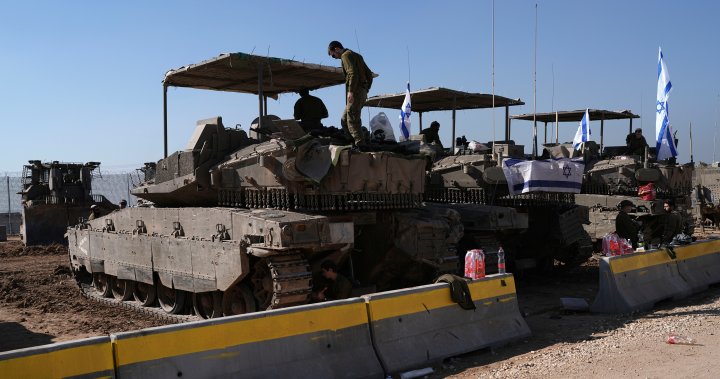The ceasefire between Hamas and Israel will come into effect on Sunday at 8:30 a.m. local time (06:30 GMT), the Qatari mediator announced on Saturday, as families of hostages held in Gaza prepare to receive news of their loved ones and that the Palestinians prepare to receive the released detainees and humanitarian relief. groups rushed to mount a wave of aid.
The Israeli Cabinet’s overnight approval of the deal, in a rare meeting during the Jewish Sabbath, sparked a flurry of activity and a new wave of emotions as relatives questioned whether the hostages would be rendered alive or dead. The names of the first freed hostages are expected to be released later Saturday.
The pause after 15 months of war is a step toward ending the deadliest and most destructive fighting ever recorded between Israel and the militant group Hamas – and comes more than a year after the only other ceasefire achieved .
The first phase of the ceasefire will last 42 days, and negotiations on the much more difficult second phase are expected to begin in just over two weeks. After these six weeks, the Israeli security cabinet will decide how to proceed.
Israeli airstrikes continued on Saturday and Gaza’s health ministry said 23 bodies had been taken to hospitals in the past 24 hours.
“What is this truce that kills us hours before it begins? asked Abdallah Al-Aqad, the brother of a woman killed by an airstrike in the southern town of Khan Younis. Health authorities said a couple and their two children, aged 2 and 7, died.
And sirens sounded across central and southern Israel, with the army claiming to have intercepted projectiles launched from Yemen. Iran-backed Houthi rebels have stepped up their attacks in recent weeks, calling it a show of solidarity with Palestinians in Gaza.

Get the latest national news
For news impacting Canada and around the world, sign up to receive breaking news alerts sent directly to you as they happen.
In an article on
“The first thing I will do is go check my house,” said Mohamed Mahdi, a displaced father of two from the Zaytoun neighborhood of Gaza City. He also looks forward to seeing his family in southern Gaza, but he “remains concerned that one of us could be martyred before we can meet.”

In the first phase of the ceasefire, 33 hostages in Gaza are expected to be released over six weeks in exchange for 737 Palestinian prisoners held by Israel. The Israeli Ministry of Justice published a list of prisoners, all of whom were younger or female.
According to the ceasefire plan approved by the Israeli government, the exchange will begin on Sunday at 4 p.m. (2 p.m. GMT). The plan calls for three living female hostages to be returned on the first day, four on the seventh day and the remaining 26 over the next five weeks. In each exchange, Palestinian prisoners will be released by Israel once the hostages arrive safely.
Also released are 1,167 Gazans who were not involved in the Hamas attack on October 7, 2023 that sparked the war. All women and children under the age of 19 from Gaza detained by Israel will be released during this phase.
All Palestinian prisoners convicted of deadly attacks will be exiled in Gaza or abroad – some for three years and others permanently – and will not be allowed to return to Israel or the West Bank.
The remaining hostages in Gaza, including male soldiers, are to be released in a second phase which will be negotiated during the first. Hamas has said it will not release the remaining prisoners without a lasting ceasefire and a complete withdrawal from Israel.
Also during the first phase of the ceasefire, Israeli troops are to withdraw to a buffer zone approximately one kilometer wide inside Gaza, along its borders with Israel.
This will allow many displaced Palestinians to return home, particularly to Gaza City and largely isolated and devastated northern Gaza. With most of Gaza’s population sheltered in huge, squalid tent camps, Palestinians are desperate to return to their homes, even though many of them have been destroyed or badly damaged.
Gaza is also expected to see an increase in food, medical supplies and other humanitarian aid. Trucks were lined up on the Egyptian side of the Rafah border crossing towards Gaza on Friday.
On Saturday, two Egyptian government ministers arrived in the northern Sinai Peninsula to oversee preparations for the delivery of aid through the Rafah crossing as well as that of Kerem Shalom, and to receive the evacuation of injured patients, the Egyptian Ministry of Health said.
The ceasefire plan approved by the Israeli Cabinet stipulates that all trucks entering Gaza will be subject to Israeli inspections.
The Hamas attack on October 7 killed some 1,200 people and left another 250 captive. Nearly 100 hostages remain in Gaza.
Israel responded with an offensive that killed more than 46,000 Palestinians, according to local health authorities, who do not distinguish between civilians and militants but say women and children account for more than half of the deaths.
© 2025 The Canadian Press





